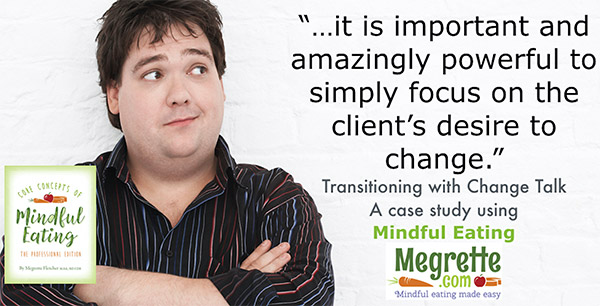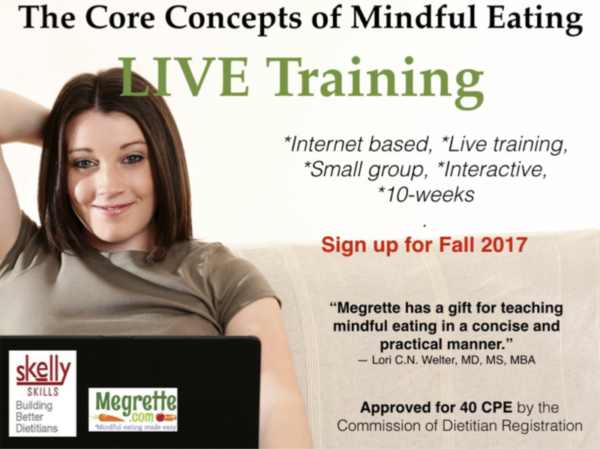Transitions are often times of mindless eating. There are many pulls which can distract a person from being present – such as habits, conditioning, and emotions. In the last post, you learned mindfulness provides your client with both an awareness and an opportunity to associate a new behavior with a transition. In this post, we are going to learn more about change talk.

Motivational interviewing explains our clients are giving us clues about what they want to do all the time. The problem is sometimes we don’t hear the clues. As health care professionals, we can become deaf to our client’s desire to change when we focus on our jobs, our tasks, and our own needs. What do I mean by this? In the last post, we met Tyler. Tyler has pre-diabetes. If I get too caught up in this diagnosis and feel the need to educate Tyler on what prediabetes is all about, I might miss the many clues he is giving me in telling me he wants to change.
Here is a small segment of the counseling conversation Tyler had in the last post.
Counselor: “There are a lot of reasons why the drive-thru is so appealing!”
Tyler: “Yes, I guess there are.”
Counselor: “Are the drive-thru food choices helping your health?”
Tyler: “I wish! Trust me; I eat crap when I hit the drive-thru! I need to break this habit.”
Counselor: “After a long day, when you are hungry, and if you don’t have something made at home, you are pulled into your unhelpful habit of using the drive-thru for dinner.”
Tyler: “I do, and I want to work on figuring this out.”
After reading this counseling segment can you identify Tyler’s desire? The desire to change is necessary to hear. If you identified the following in the dialogue:
“I need to break this habit” and “I do, and I want to work on figuring this out,” your ears are tuned into his desire to change.
In the book Motivational Interviewing in Nutrition and Fitness by Dawn Clifford and Laura Curtis, the acronym DARN CAT is explained (p. 59.) including the Desire to change, Ability to change, Reasons to change, and Need to change with CAT representing Commitment to change, Activation of change, and Taking Steps.
Without getting too far ahead of ourselves, it is important and amazingly powerful to simply focus on the client’s desire to change. The desire to change, to stop dieting, to check in with hunger, to pause and connect with greater intention are all behaviors that are part of mindful eating. Supporting our clients to have these wishes instead of starting another inflexible diet with lots of rules which are unlikely to be sustainable is going against the ingrained dieting culture of our society. Nurturing and supporting this “crazy” idea that hunger guides Tyler in his food and eating choices may give him the ability to see an alternative to dieting. It could also support his reason for “checking in” and his need to find a sustainable plan to help manage his pre-diabetes.

The truth is you don’t know how Tyler will receive the non-dieting, mindful eating message you offer. So, shift the counseling intention from giving information to listening to Tyler. Really listen to Tyler’s desire to “…work to figure it out.” This can start with a few open-ended questions such as, “Walk me through what you think is stopping you from eating healthier” or “Let’s assume you are still going to be working crazy hours and you will need to hit the drive thru, share with me a few meals which could offer a healthier option for you?”
Hearing a client’s desire to change is an amazing skill to cultivate. If you are curious about other ways to empower and motivate your clients, consider, The Core Concepts of Mindful Eating: Professional Edition. It offers dietitians and health professionals a way to see the big picture of Mindful Eating. If you are looking to deepen your understanding of Mindful Eating The Core Concepts of Mindful Eating LIVE Training starts September 13 and runs thru November 15, 2017. Of course if you just want to refresh or sharpen your Motivational Interviewing skills, Dawn and Laura’s book, Motivational Interviewing in Nutrition and Fitness is a wonderful resource.
Stay tuned as we continue to explore the theme of transitions. The next post is about why establishing a mindfulness practice, such as pausing is so helpful when addressing transitions, so sign up for Mindful Eating Made Easy Counseling Blog today!

